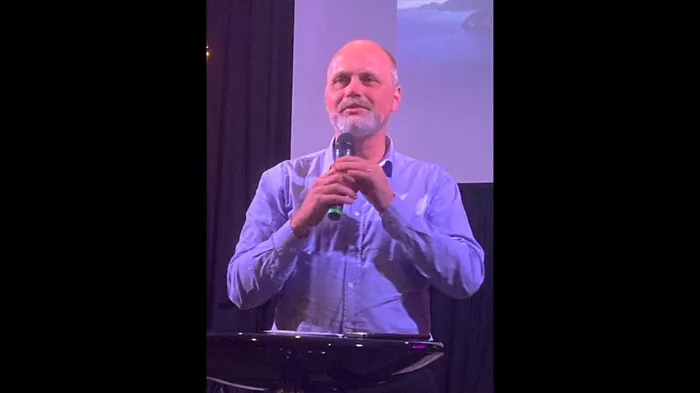Helping the homeless to help themselves

U-Turn director Jean-Ray Knighton.
A voucher is the kindest thing you can give to a homeless person. This was the message at a talk last week about homelessness in Fish Hoek.
The talk, attended by about 60 people on Tuesday August 23, was organised by U-Turn, a non-profit organisation that helps the homeless. It runs a service centre out of a double-decker bus on Beach Road and earlier this year it introduced Mi-Change vouchers, which can be redeemed for a meal, clothing, toiletries, a shower, blankets, or a safe place to sleep (“Cashless way to help the homeless,” Echo, June 30).
Johann Kikillus, director of Soteria Ministries, said there were 68 homeless people in Fish Hoek in 2020, and today there were 120.
“Every week we see new faces,” he said.
He said he had identified seven types of homeless people on the streets:
• The truly homeless who do not have money to afford food and accommodation. “This group is going to mushroom in the next five years if we don’t do something about it,” he said.
• The mentally ill who end up on the streets because of inadequate state health facilities to care for them.
• Runaways. These are often mothers with children, teenagers and young adults escaping volatile home situations and with nowhere to go due to a shortage of beds in shelters and safe houses.
• Temporary street people who migrate from Ocean View, Lavender Hill, Steenberg, and Plumstead to spend time in Fish Hoek. They have either been kicked out of their own houses or have been forced to work on the streets and some have criminal intentions.
• Drug addicts. According to Mr Kikillus, this group is growing quickly. Alienated them from their families, they often resort to crime to feed their addiction.
• Gangsters claiming turf or to hiding after a shooting in Ocean View.
• Chosen lifestyle. These are the people who choose to be on the streets and don’t want to leave.
Mr Kikillus said Fish Hoek had all seven categories of homeless people, and the biggest “draw card” to Fish Hoek and Simon’s Town was “an abundance of soft targets because people are happy to hand out money”.
He appealed to the public to stop handing out money or anything that could be used as “currency” such as nappies, formula milk, blankets, and dry food as it could be traded for drugs.
“By doing this, you are enabling addicts and those with criminal intent. They have told me that they come to Fish Hoek because it’s the land of milk and honey.”
He said he was “very happy” that U-Turn was in Fish Hoek, and churches, businesses and residents had to be on the same page to make their efforts work.
Marc Yates, chairman of the Business Improvement District (BID) echoed Mr Kikillus’s words about handouts.
“My ultimate goal is to improve business on Main Road, but we need to address the homeless issue to achieve this. We have to remove cash from the streets. Our community is the most giving community that gives from the bottom of their hearts. That generosity can sometimes be dangerous.”
He encouraged people to give directly to the organisations that work with the homeless or to buy the vouchers and hand them out instead.
U-Turn operates from Monday to Friday from 8.30am to 4.30pm and from 1pm on Tuesdays. Lunches are provided by My Father’s House a community food kitchen in Simon’s Town, and The Net, a non-profit that helps the homeless leave the streets, works with volunteers to provide food on the weekends.
U-Turn director Jean-Ray Knighton said the 25-year-old organisation had services centres in Claremont, Parow, Mitchell’s Plain Muizenberg, and now in Fish Hoek, and they gave people skills to overcome homelessness, using a four-step programme that included meeting basic needs, such as food and clothing and offering rehab and work-readiness support.
U-Turn graduate and spokesperson Malixole Sikhungo obtained a Bachelor of Law from Unisa with 10 distinctions thanks to U-Turn. He said he had been on the streets for many years in the CBD area.
After joining U-Turn, he started working as a car guard and saved enough money to complete his matric, and two years later, he enrolled with Unisa for his degree.
Looking back at his time on the streets he said: “There were days that I would go and search for food - it’s not that I didn’t have any money, I had about R80, but I had to use it to feed my drug addiction, and I would go as far as scratching in rubbish bins.”
He said he knew where to beg and knew he would always get food there.
“I get emotional when I look at how far I've come. When you give them money and food, you put them on the back foot and they can’t progress with their lives,” he said.
Mi-Change vouchers are redeemable at any partnering service provider displaying the Mi-Change sign. A pack of vouchers costs R50 and contains four vouchers. Vouchers can be bought at several retail outlets in Fish Hoek or online at MiChange.org and will be delivered to you.

